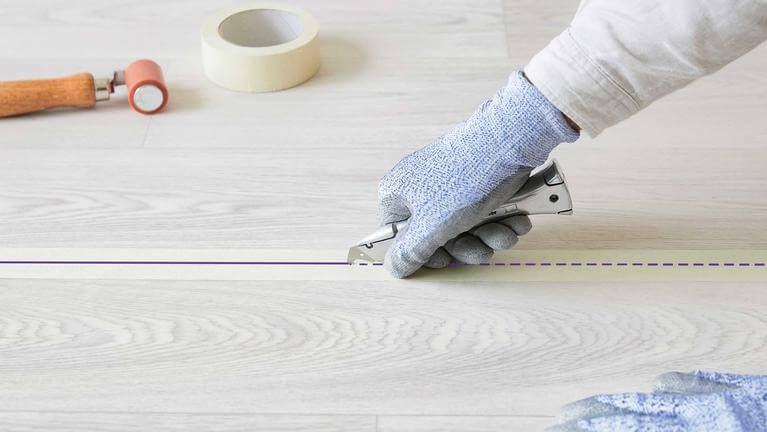Are you planning to replace your carpets with new flooring but want to do it on a budget? Vinyl flooring is your best choice.
Vinyl flooring comes in many forms and is available in your favorite texture and style. But, since flooring takes up a major portion of any renovation budget, it is always good to evaluate your material choices carefully before investing.
Let’s find out more about vinyl flooring, including whether it is the best choice of flooring material for your home.
Understanding Vinyl Flooring and Its Main Plank Types
Vinyl flooring is completely waterproof and made up of a synthetic material called polyvinyl chloride (PVC).
Vinyl planks come with a fibreglass base layer coated in PVC and a plasticizer, which is then printed and embossed with a printed layer. This is why vinyl flooring is available in so many designs and patterns. Do you want your floors to look like hardwood without hardwood’s price tag? Vinyl is the best substitute for just about any type of flooring.
Now, there are different types of vinyl plank options, so choosing the right one may seem confusing at first. These include luxury vinyl planks (LVP), wood-plastic composite (WPC) and stone-plastic composite (SPC). Even though they all seem the same at first glance, there are crucial differences.
- LVP flooring is both popular and waterproof. Its rigid construction makes the planks extremely durable. Luxury vinyl planks are popular for their stunning and realistic looks and are ideal for moderate to high traffic areas.
- WPC planks are also waterproof and quite stable and usually constructed from four layers that make them soft underfoot. They are ideal for high to moderate foot traffic.
- SPC planks are a type of luxury vinyl flooring that is 100% waterproof. It has a different layer of construction than WPC. The stone-plastic composite core is almost indestructible, which takes away the warmth and softness typically found in WPC planks. These are meant for high traffic commercial areas only.
Now that you know the different types of vinyl plank flooring, let’s inspect other factors.
There are many benefits to installing vinyl flooring, but it is important to understand what it is all about before you buy.
-
Should vinyl flooring be thick?
With vinyl flooring, thickness and durability go hand in hand. However, the invention of SPC vinyl flooring has changed this a lot.
You should choose the thickness of your vinyl flooring based on the area of installation. If you are planning to install it in a high-traffic commercial space like a gym or lobby then SPC is a good choice. It is also affordable, the product is thin, and, as mentioned, the core is essentially indestructible.
For residential purposes, LVP and WPC flooring also work well.
-
What do you mean by wear layer? And how much is ideal for my project?
The wear layer refers to the durable top layer of the vinyl plank. A good wear layer protects your floors from everyday wear and tear.
You should pick a wear layer suited to the area of installation; this is judged by the foot traffic it receives. Spaces like lobbies, living rooms and other busy places need a stronger wear layer.
As mentioned, if you have a strictly commercial project then it is best to consider SPC vinyl flooring.
Here is a quick wear layer guide for your reference.
- 6 mm: Residential use
- 12 mm: Residential/light commercial
- 20+ mm: High-traffic commercial areas
-
How do I find the perfect vinyl flooring for my project?
Is vinyl flooring appropriate for your home or project? Here are some quick pointers to help you make the best decision.
- Thoroughly research vinyl flooring. Evaluate its pros and cons and consider whether it is suitable for your project.
- Take into account your lifestyle and prioritize your needs. If you are installing new vinyl floors in your home or office, consider how much foot traffic you expect. Keep in mind that your floors will be subject to wear and tear so choose wisely.
- Consider your budget. Changing your flooring is a huge undertaking and a significant investment. Even though vinyl flooring is available at great prices, be sure to check prices online and compare. Don’t forget to add transportation, shipping, and installation costs to your budget. Stay within your budget and be realistic about it.
- Go for quality, not quantity. After all, you want your floors to last. Not only is updating your floors expensive, it is also a hassle. Always use high-quality products from reputable brands to make sure your floors will last a long time.
- Speak to the experts at a reputable flooring company. They have the experience and knowledge to guide you through the installation process.
- Hire a professional to install your vinyl flooring, especially if you don’t have prior experience. Improper installation means recurring costs and is a hassle.
Properly understanding vinyl flooring will help you choose the best type for your home. Vinyl is a crowd-pleaser and an instant favourite of homeowners looking for an affordable flooring solution. Installing new floors is always exciting but comes with challenges, like selecting the right renovation company.
We hope this quick guide helps you understand the terminology surrounding vinyl flooring and how to differentiate between the different types of products. Get in touch with a reputable flooring company and start shopping!
